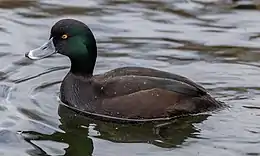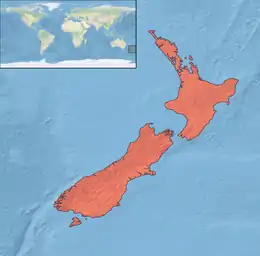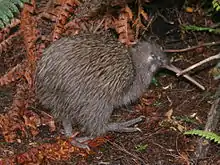New Zealand scaup
The New Zealand scaup (Aythya novaeseelandiae) commonly known as a black teal, is a diving duck species of the genus Aythya. It is endemic to New Zealand. In Māori it is commonly known as papango, also matapouri, titiporangi, raipo.[2]
| New Zealand scaup | |
|---|---|
 | |
| Male | |
| Scientific classification | |
| Kingdom: | Animalia |
| Phylum: | Chordata |
| Class: | Aves |
| Order: | Anseriformes |
| Family: | Anatidae |
| Genus: | Aythya |
| Species: | A. novaeseelandiae |
| Binomial name | |
| Aythya novaeseelandiae (Gmelin, 1789) | |
 | |
| Distribution map of the New Zealand scaup (red) | |
Description
Overall dark brown/black colors. The male has a striking yellow eye and a dark colored (greenish) head. The female is similar to the male, but without the yellow eye and has a white face patch during breeding season. A white wing bar can be seen in both sexes when in flight.[3]
Feeding
_KJB.JPG.webp)
The scaup is a diving duck which may submerge for twenty to thirty seconds and go down three metres to look for aquatic plants, small fish, water snails, mussels and insects.[4][5] It is sometimes seen with the Australian coot (Fulica atra); it is thought that the scaup takes advantage of the food stirred up by the coots as they fossick for shrimps.[5]
Distribution
It is found throughout both the North and South Islands of New Zealand in deep freshwater lakes and ponds.[3] Unlike other members of this genus, the scaup is not migratory, although it does move to open water from high country lakes if they become frozen in winter.[5]
Life cycle
.jpg.webp)
They nest from October to March. They lay five to eight cream/white eggs in a nest close to water, often under banks or thick cover. The nest is usually lined with grass and down.[3] The eggs are incubated for four weeks by the female. The newly hatched ducklings begin diving for food on their first outing.[5]
References
- BirdLife International (2012). "Aythya novaeseelandiae". IUCN Red List of Threatened Species. 2012. Retrieved 26 November 2013.CS1 maint: ref=harv (link)
- Moncrieff, Perrine (1961). New Zealand Birds and How to Identify Them. Whitcombe and Tombs Ltd. p. 113.
- Marshall, Janet; Kinsky, F.C.; Robertson, C.J.R. (1972). Common Birds in New Zealand. A.H. & A.W. Reed. p. 31. ISBN 0-589-00730-0.
- Orbell, Margaret (2003). Birds of Aotearoa. Reed Publishing NZ Ltd. p. 129. ISBN 0-7900-0909-9.
- Lockley, Ronald M. (1980). New Zealand Endangered Species. Cassell NZ. p. 82. ISBN 0-908572-22-0.
| Wikimedia Commons has media related to Aythya novaeseelandiae. |
| Wikispecies has information related to Aythya novaeseelandiae. |

